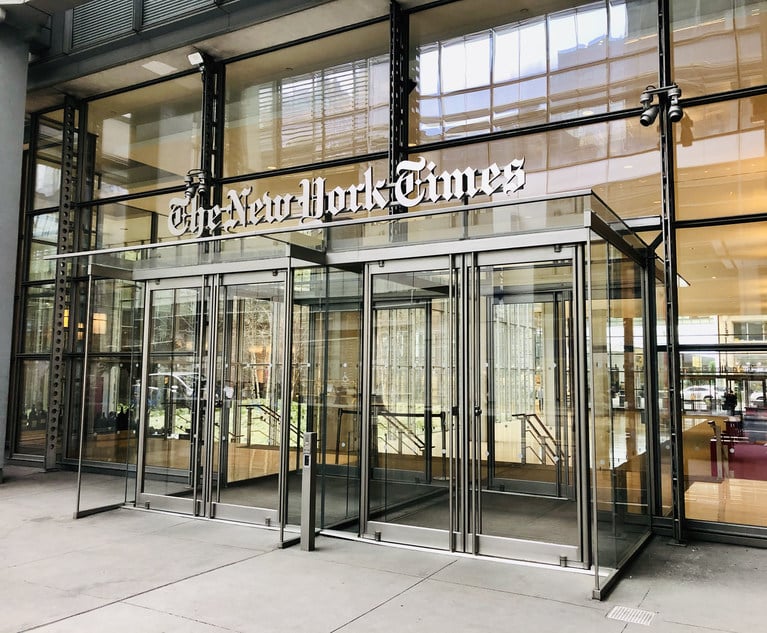 Chief Judge Janet DiFiore
Chief Judge Janet DiFioreNY Court of Appeals Strikes Down Part of Cuomo's Salary Limit on CEOs of State Health Contractors
Chief Judge Janet DiFiore wrote in the majority opinion on Thursday that the agency had exceeded its authority by attempting to limit how those providers use private funds to pay their executives.
October 18, 2018 at 12:43 PM
7 minute read
The New York Court of Appeals has struck down part of a state Department of Health regulation limiting the salaries of executive officers at state-contracted health care providers.
Chief Judge Janet DiFiore wrote in the majority opinion on Thursday that the agency had exceeded its authority by attempting to limit how those providers use private funds to pay their executives.
The DOH appeared to conceive that part of the regulation as a matter of public policy, which is outside of its purview as a state agency, DiFiore wrote.
“Rather than determining the best way to regulate toward the legislative goal identified in its enabling legislation (i.e., using state funds to purchase affordable, quality care) with respect to the soft cap DOH appears to have envisioned an additional goal of limiting executive compensation as a matter of public policy and regulated to that end,” DiFiore wrote.
A spokeswoman for the agency said they are reviewing the decision.
LeadingAge New York and the Coalition of New York State Public Health Plans brought the lawsuit against the DOH and then-state Health Commissioner Nirav Shah over the regulation in 2014.
They were represented before the Court of Appeals, respectively, by David Luntz from Hinman Straub and Henry “Hank” Greenberg, a shareholder at Greenberg Traurig. Both are based in Albany.
“We are pleased the court confirmed that the DOH exceeded its limited authority by attempting to regulate the expenditure of private funds,” Luntz said on Thursday.
The lawsuit was over a regulation promulgated by the DOH at the direction of Gov. Andrew Cuomo in 2012 to cap executive salaries and administrative costs at health care providers that receive funds from the state.
The Court of Appeals considered the validity of two parts of the regulation that attempted to limit executive salaries at covered providers, which are defined as service providers that receive more than $500,000 in state funds or state-authorized payments, namely from Medicaid, over a two-year period. Those providers must also receive at least 30 percent of their in-state revenues from the state to be considered a covered provider.
The regulation imposed a so-called “hard cap” and “soft cap” on executive salaries at those providers. It also created a “hard cap” on administrative expenses.
Under the hard cap, covered providers cannot use state money to pay their executives more than $199,000 per year. They also cannot use state money to pay for administrative costs that exceed 15 percent of their expenses.
The soft cap placed the same limit on executive salaries at covered providers regardless of the funding source, including public and private revenues, except under certain conditions. Providers can apply for a waiver to either cap, but approval is not guaranteed.
The judges were unanimous that the hard cap on administrative expenses was constitutional but differed on the limits for executive salaries.
DiFiore wrote that the hard cap was within the statutory authority of the DOH because its intended goal was to ensure that state funds were directed toward medical services rather than exorbitant overhead costs.
“The hard cap regulations are thus directly tied to a specific goal dictated by the Legislature—to efficiently direct state funds toward quality medical care for the public,” DiFiore wrote. “The hard caps accomplish that goal by limiting the extent to which state funds may be used for non-service-related salaries or disproportionately large administrative budgets, thereby channeling state funds toward the direct provision of services.”
The soft cap was different. Because it limited how covered providers use funding from private revenues, it went beyond the legislative intent of the state agency, DiFiore wrote. The soft cap instead attempted to correct a policy concern that is outside the agency's power, she said.
“By attempting to control how an entity uses its private funding, DOH has ventured beyond legislative directives relating to the efficient use of state funds and into the realm of broader public policy concerns,” DiFiore wrote. “Put another way, the soft cap imposes a restriction on management of the health care industry that is not sufficiently tethered to the enabling legislation identified by DOH, which largely concerns the expenditure of state funding for public health care.”
The New York Health Plan Association, also a plaintiff in the case, said in a statement they were disappointed the hard cap was upheld.
“Executive compensation represents only a very small fraction of health plan costs,” said Eric Linzer, president of the association. “As health plans in New York need to compete for executive talent, we remain concerned about the impact the Executive Order will have on their ability to attract and retain the most talented employees.”
Associate Judge Michael Garcia wrote in one of two separate dissenting opinions that both the hard and soft caps on executive compensation were unconstitutional. He echoed an argument made by the plaintiffs to the high court last month that there is no direct relationship between the salaries paid to executives at covered providers and the cost of the services they provide.
“The hard cap on compensation does not require that any additional funds be used for program services—it is not concerned with directing money toward 'needy New Yorkers' but away from 'overcompensated' executives,” Garcia wrote. “This is precisely the type of social policymaking prohibited by this court's prior decisions.”
Associate Judge Rowan Wilson offered a dissent that, instead, argued both caps on executive salaries should have been upheld.
He criticized the majority's use of the framework from Boreali v. Axelrod, a landmark 1987 Court of Appeals decision about the regulatory powers of executive agencies within state government. The case was over a rule promulgated by the Public Health Council, a unit within the DOH, that banned smoking at certain indoor areas that are open to the public, such as restaurants, stores, etc. The court ruled that the PHC had exceeded its regulatory authority and that only the Legislature was able to enact such a ban.
Wilson argued that Boreali, used regularly to assess conflicts of power within state government, does not apply in this case and perhaps should not be used as the standard in such cases going forward.
“Indeed, it is difficult to even articulate my disagreement with the majority on the 'soft' cap using the Boreali framework, because Boreali has become so encumbered with imprecise and inaccurate verbiage that it no longer provides a useful framework even for disagreement,” Wilson wrote.
Aside from his argument against the Boreali framework, Wilson also wrote that the soft cap should be upheld because the money received by covered providers in New York—whether public or private revenues—is fungible.
“Accordingly, just as the hard cap objectively advanced the legislatively circumscribed goal of getting the 'biggest bang for buck' in its Medicaid services, the soft cap, which is really just an anti-circumvention provision, does the same,” Wilson wrote.
He also argued that the regulation was well within the power of the DOH because it advanced the agency's statutory responsibility of only doing business with responsible contractors.
Judges Leslie Stein, Eugene Fahey and Paul Feinman joined DiFiore in the majority. Associate Judge Jenny Rivera dissented in part and sided with three sections of Wilson's opinion in favor of the state.
READ MORE:
This content has been archived. It is available through our partners, LexisNexis® and Bloomberg Law.
To view this content, please continue to their sites.
Not a Lexis Subscriber?
Subscribe Now
Not a Bloomberg Law Subscriber?
Subscribe Now
NOT FOR REPRINT
© 2025 ALM Global, LLC, All Rights Reserved. Request academic re-use from www.copyright.com. All other uses, submit a request to [email protected]. For more information visit Asset & Logo Licensing.
You Might Like
View All
New York Times Moves for $100K in Attorney Fees Against Dfinity Foundation
3 minute read
Federal Judge Slaps Down the SEC’s Attempt to Regulate Crypto Liquidity Providers
10 minute read
A Client Is Guilty; But Another Man Is Wrongfully Convicted

Trending Stories
- 1Deal Watch: Latham, Paul Weiss, Debevoise Land on Year-End Big Deals. Plus, Mixed Messages for 2025 M&A
- 2Bathroom Recording Leads to Lawyer's Disbarment: Disciplinary Roundup
- 3Conn. Supreme Court: Workers' Comp Insurance Cancellations Must Be Unambiguous
- 4To Avoid Conflict, NYAG Hands Probe Into Inmate's Beating Death to Syracuse-Area DA
- 5Scripture-Quoting Employee Sues Company for Supporting LGBTQ Pride
Who Got The Work
Michael G. Bongiorno, Andrew Scott Dulberg and Elizabeth E. Driscoll from Wilmer Cutler Pickering Hale and Dorr have stepped in to represent Symbotic Inc., an A.I.-enabled technology platform that focuses on increasing supply chain efficiency, and other defendants in a pending shareholder derivative lawsuit. The case, filed Oct. 2 in Massachusetts District Court by the Brown Law Firm on behalf of Stephen Austen, accuses certain officers and directors of misleading investors in regard to Symbotic's potential for margin growth by failing to disclose that the company was not equipped to timely deploy its systems or manage expenses through project delays. The case, assigned to U.S. District Judge Nathaniel M. Gorton, is 1:24-cv-12522, Austen v. Cohen et al.
Who Got The Work
Edmund Polubinski and Marie Killmond of Davis Polk & Wardwell have entered appearances for data platform software development company MongoDB and other defendants in a pending shareholder derivative lawsuit. The action, filed Oct. 7 in New York Southern District Court by the Brown Law Firm, accuses the company's directors and/or officers of falsely expressing confidence in the company’s restructuring of its sales incentive plan and downplaying the severity of decreases in its upfront commitments. The case is 1:24-cv-07594, Roy v. Ittycheria et al.
Who Got The Work
Amy O. Bruchs and Kurt F. Ellison of Michael Best & Friedrich have entered appearances for Epic Systems Corp. in a pending employment discrimination lawsuit. The suit was filed Sept. 7 in Wisconsin Western District Court by Levine Eisberner LLC and Siri & Glimstad on behalf of a project manager who claims that he was wrongfully terminated after applying for a religious exemption to the defendant's COVID-19 vaccine mandate. The case, assigned to U.S. Magistrate Judge Anita Marie Boor, is 3:24-cv-00630, Secker, Nathan v. Epic Systems Corporation.
Who Got The Work
David X. Sullivan, Thomas J. Finn and Gregory A. Hall from McCarter & English have entered appearances for Sunrun Installation Services in a pending civil rights lawsuit. The complaint was filed Sept. 4 in Connecticut District Court by attorney Robert M. Berke on behalf of former employee George Edward Steins, who was arrested and charged with employing an unregistered home improvement salesperson. The complaint alleges that had Sunrun informed the Connecticut Department of Consumer Protection that the plaintiff's employment had ended in 2017 and that he no longer held Sunrun's home improvement contractor license, he would not have been hit with charges, which were dismissed in May 2024. The case, assigned to U.S. District Judge Jeffrey A. Meyer, is 3:24-cv-01423, Steins v. Sunrun, Inc. et al.
Who Got The Work
Greenberg Traurig shareholder Joshua L. Raskin has entered an appearance for boohoo.com UK Ltd. in a pending patent infringement lawsuit. The suit, filed Sept. 3 in Texas Eastern District Court by Rozier Hardt McDonough on behalf of Alto Dynamics, asserts five patents related to an online shopping platform. The case, assigned to U.S. District Judge Rodney Gilstrap, is 2:24-cv-00719, Alto Dynamics, LLC v. boohoo.com UK Limited.
Featured Firms
Law Offices of Gary Martin Hays & Associates, P.C.
(470) 294-1674
Law Offices of Mark E. Salomone
(857) 444-6468
Smith & Hassler
(713) 739-1250






